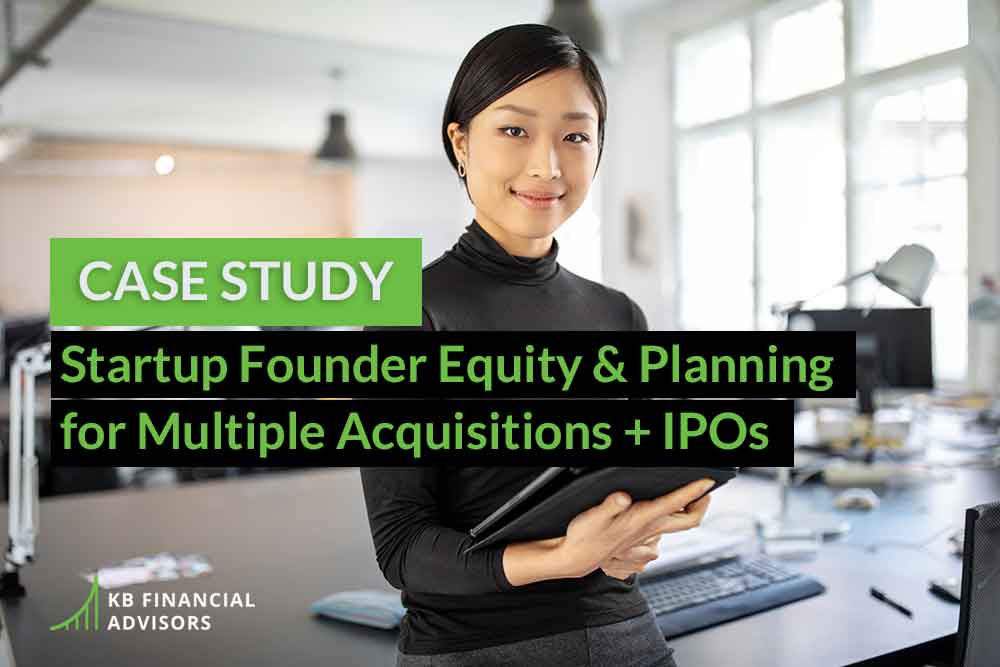When you start a company, you’ve probably got big goals for it.
In the tech world, big goals = acquisitions and IPOs.
And from a financial planning perspective, acquisitions and IPOs are BIG deals.
After all, as a startup founder, they are THE first major chance you have to turn your hard work into serious wealth and financial freedom.
As a startup founder, you’ll be fantastic about preparing your company for these events, but you also need to prepare your personal finances. After all, it would suck to do all the hard work of starting a company and growing it to success, only to miss out on the wealth potential it could provide you.
In this post, we’ll help you wrap your head around how all this works, talk about the types of startup founder equity you’ve got, and what types of events to plan for. We’ll also walk you through a client case study to show you how it works in the real world.
Case Study: Startup Founder Eric Goes Through FOUR Liquidity Events
Eric (name changed) is our client and a two-time startup founder.

He founded his first company nine years ago, which was acquired two years after the initial startup. After the acquisition, he kept working there for two more years before he left to do other things.
Four years after that, the acquiring company went public, meaning Eric had a lot of wealth-building opportunities with that IPO.
But that’s not all:
Five years ago, Eric founded his second company, which was acquired after four years. The acquiring company went public last year, and Eric’s still employed full-time by the acquiring company… which means he’s got even more opportunity for wealth building from his startup founder equity.
We’ll dive deeper into Eric’s financial situation in a bit, but first let’s understand the different elements Eric has (and you’ll likely have) to deal with:
The Two Major Types of Startup Founder Equity
As a startup founder, you’ll have two major types of equity in the companies you start: founders shares and QSBS (aka qualified small business stock).
Founders Shares
These are the shares created and issued at the company’s founding… back when you signed the paper work with your partners, and you all decided how much of the company each person “owned.”
At the founding, these shares are usually worth little to nothing, which makes your cost basis effectively zero. (This means that when you liquidate these shares, their full value is taxable, since you likely didn’t pay anything for them upfront.)
The good thing is, since the holding period of founders shares starts at the moment they’re issued, they almost always qualify for lower tax rates via long-term capital gains, since you’ll have held onto them for a year or more before selling.
Qualified Small Business Stock (QSBS)
Qualified small business stock are amazing, because they’re the one way you can cash in on your startup founder equity without paying anything in capital gains tax. (Yes, you read that right: a potentially $0 federal tax bill on your QSBS.)
To qualify, though, it has to meet a number of benchmarks:
- It has to be issued by an active C corporation in the United States
- The C corporation has to have less than $50 million in assets when the shares are issued
- You have to hold onto the hares for at least five years to qualify for the tax exclusion
The exclusion also maxes out at $10 million dollars in gains or 10x your cost basis, whichever is greater.
If you’re planning on your company getting acquired and/or going through an IPO, pay CLOSE attention to these C corporation requirements in the early days: a lot of times companies first start out as LLCs and then restructure into a C corp after a funding round.
Your shares are only eligible for the QSBS qualification when they’re issued after your company becomes a C corp.
That five-year time period is essential too: if it’s been less than five years since your company restructured as a C corp, your shares won’t qualify for the QSBS tax exemption. That doesn’t necessarily mean that an acquisition or an IPO is a bad idea, it’s just something to be aware of.
Back to Eric, our Startup Founder…
Now that you understand the difference between founder’s shares and QSBS (and how valuable both of them are), let’s walk through Eric’s financial journey a little more in-depth:
1. Acquisition of Company #1
Eric founded his first company nine years ago, and it was acquired two years later by a larger company. When that happened, Eric didn’t cash out or liquidate any of his shares… and instead had the shares from the company he founded rolled over into shares of the parent company.
He also stayed on as an employee for two years after the acquisition happened, and was granted double-trigger RSU as an employee. This grew his stake in the company and upped his wealth potential for the next liquidity event.
2. IPO of Company #1
Even though Eric had already left the company, he still had shares he could cash out and liquidate after the six-month lockout after the IPO happened.
His shares from the first company he founded were now past the five-year holding period, and met all the requirements for QBSB, which was fantastic for him.
He also had RSU that were released at the IPO, and their value was immediately charged to him as taxable income, whether he sold them or not. (Which happens with all RSU, and why I like to advise selling them ASAP.)
Unfortunately, the stock did not do well after the IPO. It initially rose by 24%, but dropped again and has been stuck trading near the initial IPO price. (Which is better than going below the IPO price, but still not the most ideal situation.)
Because of this, Eric and I decided to sell all his RSU shares first, and then to hold and sell his QSBS incrementally over three years hoping that the stock’s performance would improve.
BUT since Eric’s shares were held in two different accounts at two different financial institutions, it was difficult to track for tax purposes. To make sure everything was done right, Eric hired me to help him source the shares, organize the share lots, and accurately report the cost basis and QSBS on THREE separate tax returns.
3. Acquisition of Company #2
Clearly, Eric’s a talented startup founder, and the second company he started was acquired four years after he initially founded it. He also thought the company acquiring his company would go through an IPO in the next 12-18 months, with a ~$40 share price.
The deal structure was that Eric received $500,000 in cash, which was subject to long-term capital gains tax since he’d had the shares for more than a year, but the five-year mark hadn’t passed yet.
For the rest of his shares, he received “shares for shares”, and we noted the dates on when each lot of these shares would qualify for QSBS so he could liquidate them and get his tax benefits.
Then, since Eric was hired on as a full-time employee as a part of the acquisition, he also started earning new stock options as a part of his employee compensation plan.
This acquisition was a little more financially complex for Eric than the first one, which was why having a financial planner help him plot out the steps was so important.
4. IPO of Company #2
Just like Eric predicted, the company that acquired his startup went public a year later. But instead of going public at $40 per share, it was 5x that. (Around $200 per share! ????)
This IPO was clearly more successful than the last one, and because of that, the company decided to do a secondary offering… which you can prepare for in the same way you’d prepare for a tender offer.
In a secondary offer, you’re allowed to sell a small percentage of your vested equity and shares. I recommended selling the full amount allowed of his vested options, because the price was so much higher than expected and it allowed Eric to get his hands on some cash ASAP. He continued to hold onto his original shares until the five-year period passed so they’d qualify for the QSBS tax exemption.
By selling this small percentage of his vested options, even with paying the taxes, Eric was able to get his hands on more cash than he’d imagined and move closer to his goal of complete financial independence. This let him be more concerned with his long-term financial goals, instead of getting stressed out about the day-to-day stock price.
So… What Should You Do?
If you’re a startup founder, it’s never too soon to start wrapping your head around your financial plan and preparing for liquidity events.
I’d highly recommend working with a financial professional on this, especially since a disorganized financial plan can cost you many, many thousands of dollars over the years.
But, if you’re looking for tips to get started on your own while you’re finding the right financial advisor for you, here are three places to start:
1) Get Organized
Getting organized with your shares is super challenging for startup founders, because they’re usually tracked in so many different places. (Especially after an acquisition happens.)
In Eric’s case, for example, his initial startup founder equity was just tracked on a spreadsheet, but then the accounts moved to different financial institutions as his companies grew and were acquired.
You’ll need to know what shares you have, when they were issued, where they’re being tracked, and what stipulations surround them in your legal documents.
2) Liquidate Early if You Can
Early on, you’re usually only able to sell a small percentage of the equity you have in your company, which means those early offers often come at good prices, because there’s less available. (Remember the rules of supply and demand?)
Plus, cashing out early lets you create financial independence separate from your company, so you have more solid footing to stand on even if things in your business don’t go according to plan.
3) Create a Long-Term Plan
This is best done with a financial advisor who knows the ins and outs of different share types, stock options, and allll the tax laws surrounding everything.
This way, you can make the smartest moves (which is sometimes selling, and sometimes holding longer-term for a lower tax rate), and become truly financially independent.



